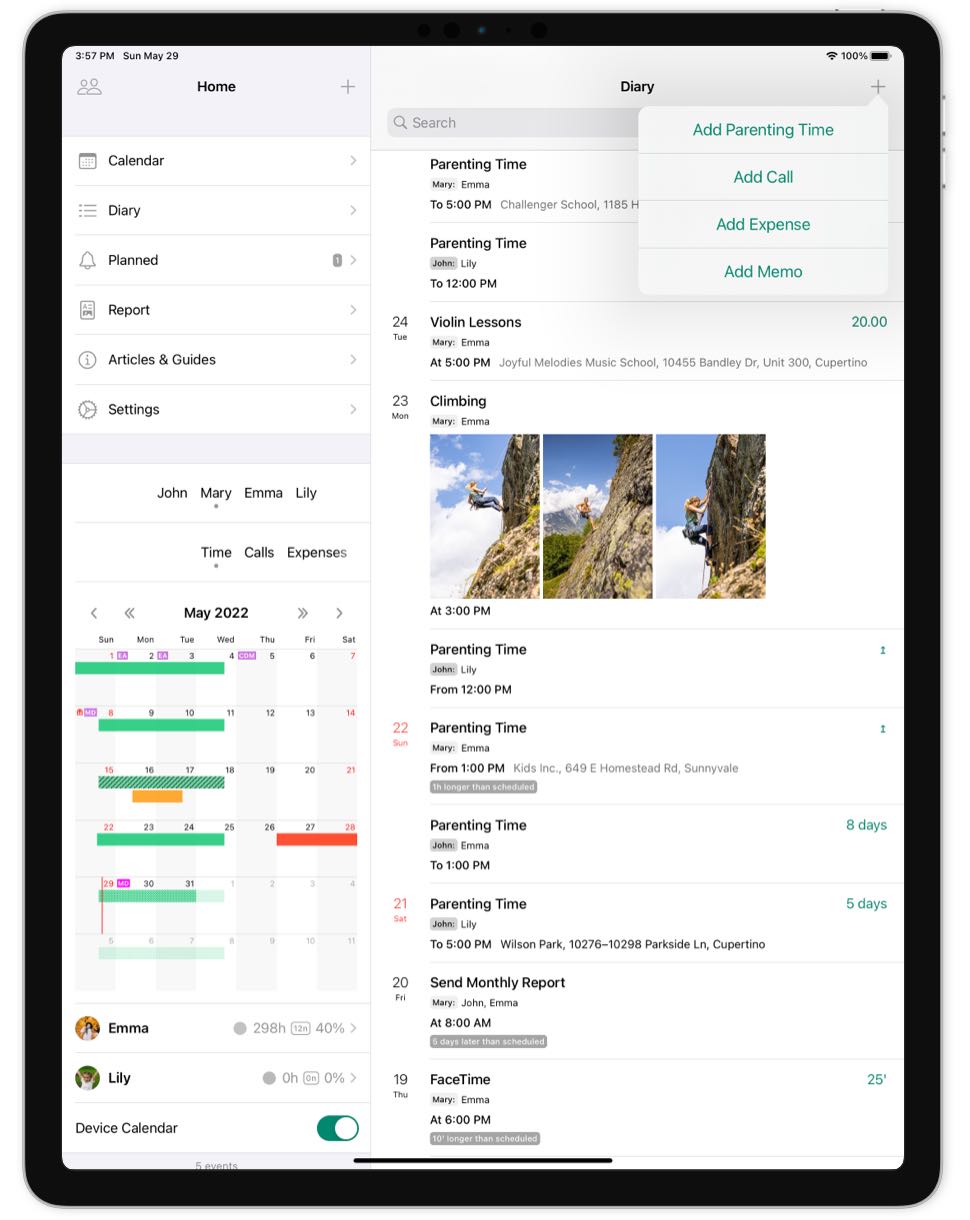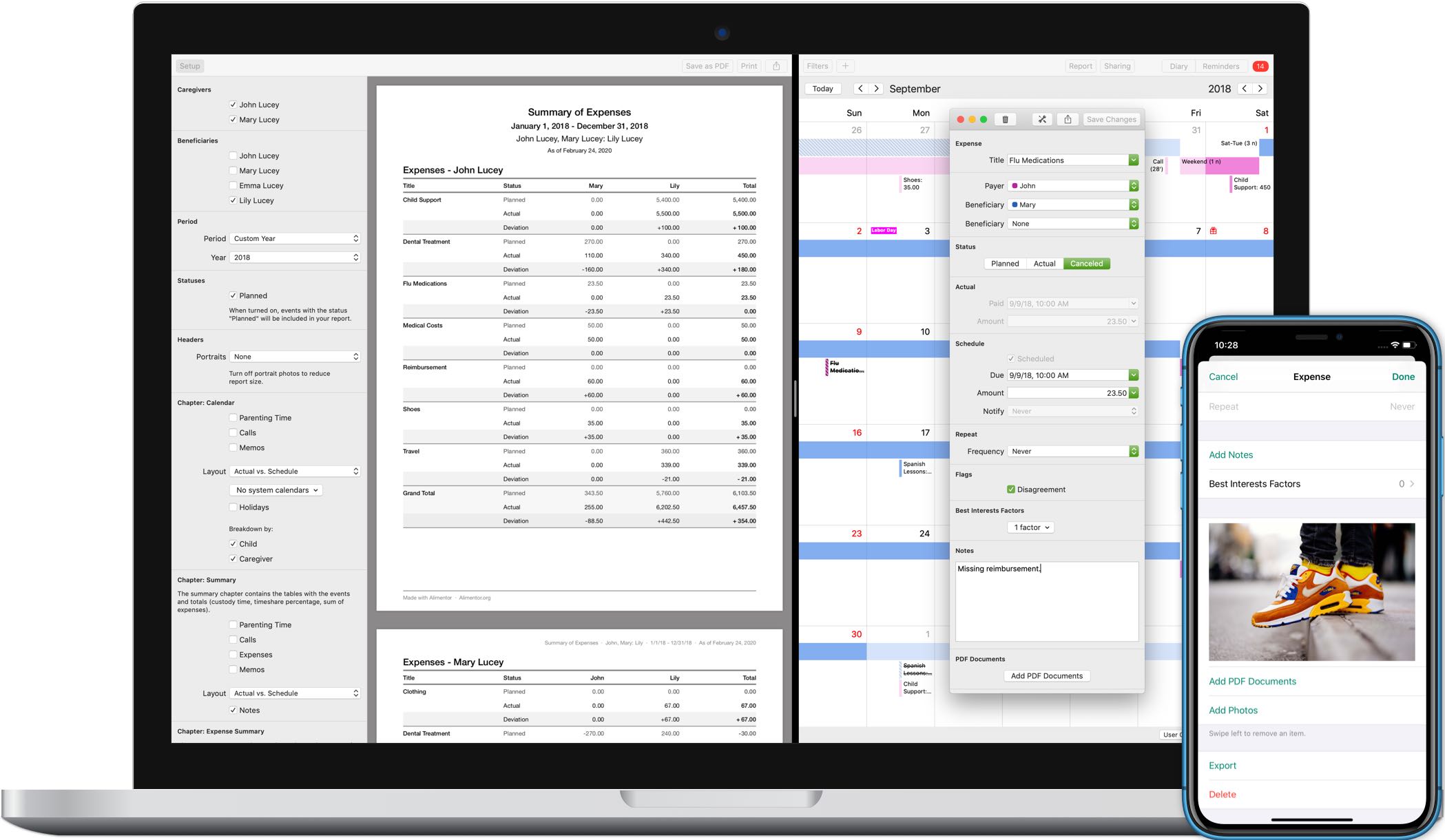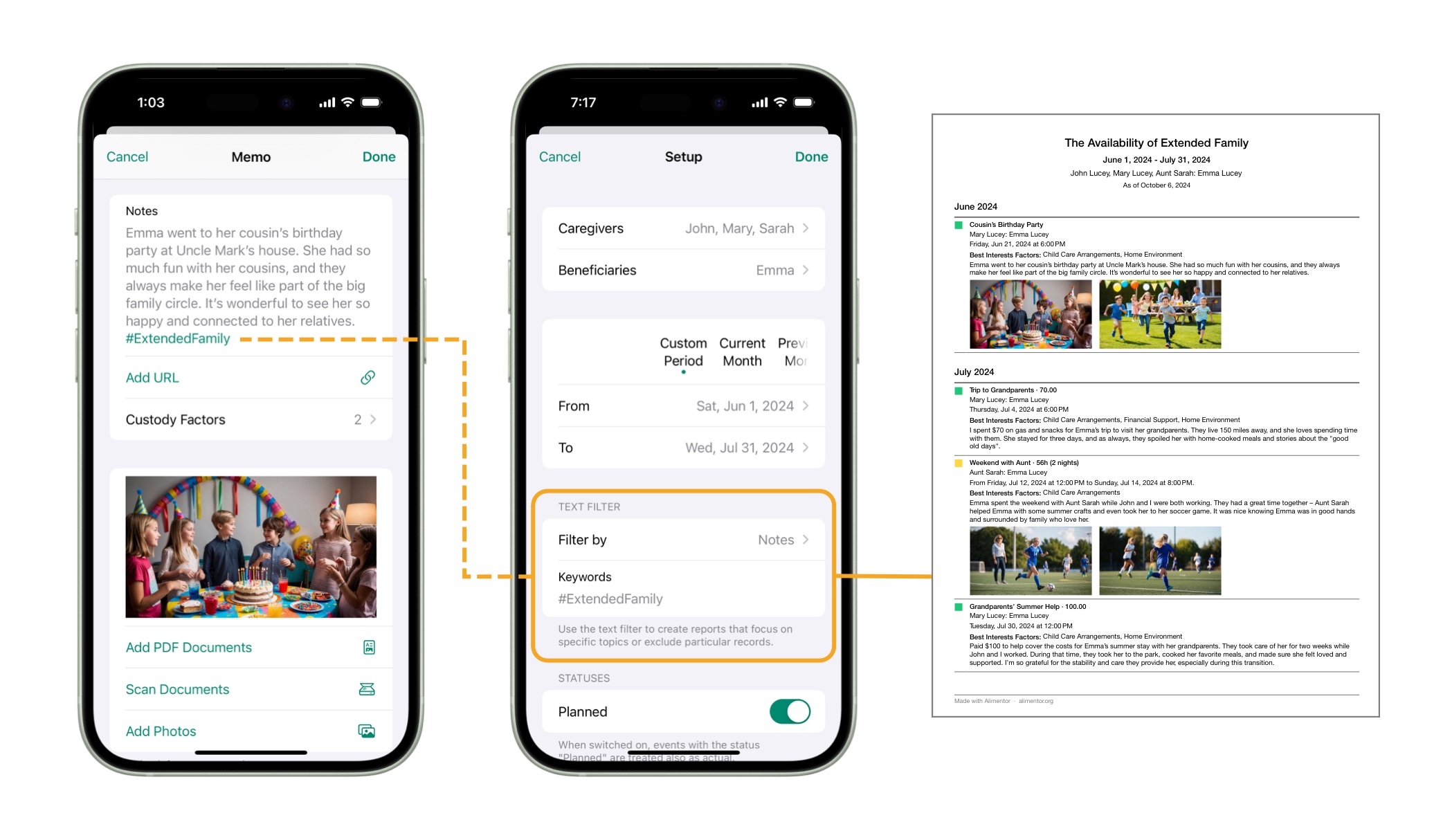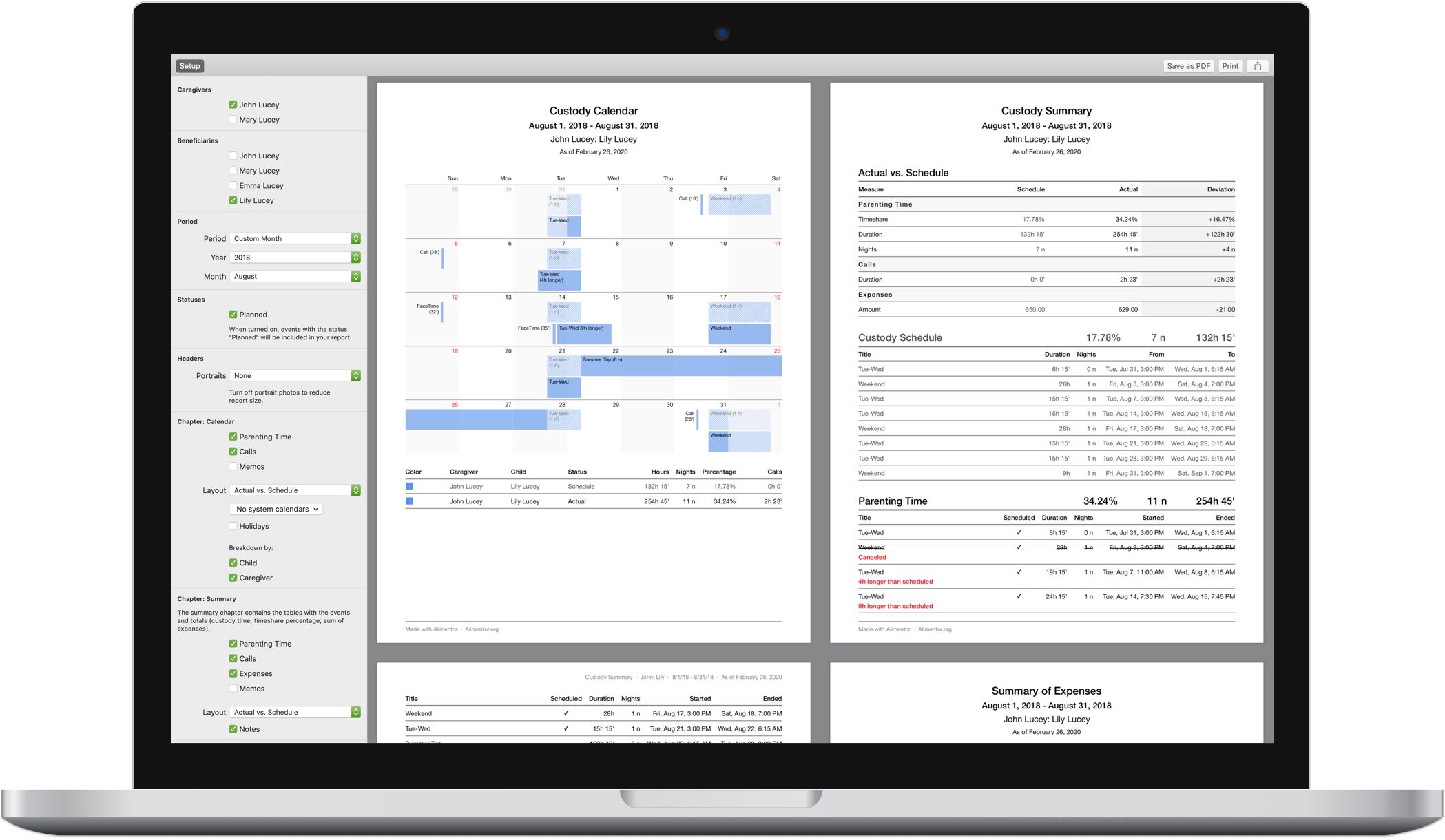Documentation in Child Custody Cases
Increase your chances of reaching an optimum child custody agreement by collecting and organizing the right evidence.

Increase your chances of reaching an optimum child custody agreement by collecting and organizing the right evidence.

If you’re facing—or even contemplating—a custody dispute, you’re probably already feeling the emotional weight of it all. Long before formal court dates appear on the calendar, paperwork and legal jargon can feel overwhelming. Yet one of the simplest, most powerful tools you have is good documentation. Whether you’re gathering notes now so that a future mediation runs smoothly, or you’re standing in front of a judge next month, maintaining clear records is one of the best ways to protect your child’s future and make sure your side of the story is fully heard.
Well-organized notes and records do more than list dates and facts. They give mediators, evaluators, and judges a window into real life—your day-to-day relationship with your child, your reliability, your efforts to provide stability. When the time comes to decide on custody terms—whether that’s around a mediation table or in a courtroom—clear, consistent evidence can tip the balance toward a plan that truly meets your child’s needs.
This article will walk you, step by step, through gathering and organizing the paperwork that matters most in a custody case. We’ll cover which records judges and mediators want, when to start collecting them, and a few simple habits that keep everything tidy and easy to find.
We’ll also show you how the Alimentor app can lighten the load. Alimentor turns your notes, calendars, and receipts into clear, court-ready reports with just a few taps—no spreadsheets, no formatting headaches, and no risk of missing a key detail.
For a brief and engaging overview of essential information on documenting your child custody case, listen to the 11-minute podcast below.
Generated with Google NotebookLM
A parenting time calendar, also known as a co-parenting calendar or visitation schedule, is a vital tool for divorcing or separated parents to effectively manage and document the time their children spend with each parent. This calendar details the specific dates, times, and locations for child exchanges, helping to minimize confusion and reduce conflicts. By serving as a structured and reliable record, it promotes consistency and stability for the child while also providing clear, factual evidence of each parent’s involvement in their child’s life, which can be crucial in custody disputes.
Alimentor gives you a unified, color-coded calendar to track all aspects of your parenting time—from planned visits and changes to notes, totals, and reports. No extra tools needed.
A child custody journal serves as a chronological record of events, interactions, and observations related to your child and your co-parenting relationship. When maintained consistently and objectively, it can provide invaluable evidence to support your case.
While there are no specific legal requirements for the content of a custody journal, adhering to best practices can significantly enhance its effectiveness and credibility in court. The goal is to create a comprehensive, factual record that provides insight into your child's life, your involvement as a parent, and any concerns or issues that arise.
| Alimentor Feature | How to Use for Child Custody Journal |
|---|---|
| Reminders | Set reminders for important events, deadlines, or actions. Add Alimentor widgets to your Home Screen and Lock Screen. |
| GPS Timestamps | Log locations with GPS timestamps for pick-ups, drop-offs, and other relevant events to provide verifiable evidence of your whereabouts. |
| Last Modification Date Tracking | Include the last modification date of each record in your reports. This helps produce documentation that courts may consider more reliable and less susceptible to manipulation. |
| Disagreement Flags | Highlight conflicts or issues by marking entries with disagreement flags. |
| Grouping & Tagging | Organize journal entries using titles, hashtags, and custody factors, to quickly find and report specific incidents or patterns. |
| Customizable Reports | Use custody factors, text filters and hashtags to refine the scope of your reports or to exclude unnecessary records. Set custom section titles for better organization. |
| PDF Attachments | Attach PDFs, such as emails, legal documents, or evidence, directly to relevant journal entries for comprehensive documentation. |
| Document Scanning | Attach digital copies of important documents, such as court orders or medical records, ensuring all related information is easily accessible. |
| Photo Attachments | Include photos to visually document evidence (e.g., your child’s health, injuries), significant events, time spent together, or milestones. |

Collecting and organizing financial records will help you present a clear and accurate picture of your financial situation during the custody proceedings. This documentation can be crucial in determining child support, evaluating each parent’s financial stability, and ensuring that your child’s best interests are met.
Dividing your financial documents into two groups based on whether they need to be collected once or on an ongoing basis can help you stay organized and ensure you have all necessary documentation for your child custody case. Here’s how you can categorize them:
| Alimentor Feature | How to Use for Financial Documentation |
|---|---|
| Expense Tracking | Track all child-related expenses like education, healthcare, and activities. Optionally, monitor household and personal expenses to maintain a complete financial record. |
| Document Scanning | Scan and attach digital copies of receipts, invoices, and other key documents to keep them digitized and accessible. |
| PDF Attachments | Attach PDFs like contracts, statements, or receipts to relevant records for easy reference within the app. |
| Grouping & Tagging | Organize records by titles, hashtags, and custody factors to simplify retrieval and reporting. |
| Budget & Planning | Plan and manage expenses and child support payments (made or received). Set reminders, track missing payments or disagreements. |
| Reimbursement Tracking | Track reimbursements owed or received to ensure accountability. |
| Planned vs. Actual | Compare planned expenses and payments with actuals to identify and report discrepancies. |
| Reporting | Generate customizable reports of financial data, filtered by titles, hashtags, or custody factors. |
| Export to Spreadsheet | Export records to an XLSX file (Excel) for easy sharing or analysis. |
To learn more, read: Expense Documentation for Divorce, Custody, and Taxes

Alongside the records already listed, the following documents can further strengthen your child custody case, especially when formal legal evidence is needed.
The term "best interests of the child" (also known as "custody factors") refers to the deliberation that courts undertake when deciding what type of services, actions, and orders will most effectively serve a child’s needs and well-being. This process also involves deciding which parent or caregiver is best suited to take primary responsibility for the child’s care.
Courts typically base their "best interests" determinations on a number of factors related to the child’s circumstances and the parent or caregiver’s ability to meet those needs.
Grouping your records by custody factors can help you systematically present evidence that aligns with these considerations, ensuring that your documentation is both organized and relevant to your case.
When using Alimentor to collect documentation, you can tag your records with best interest factors (custody factors) listed below. This allows you to generate the "Best Interests of the Child" report. Providing this document to your attorney can streamline the preparation of a legal brief, thereby reducing the time required for case preparation.
Alimentor provides a universal list of custody factors that is designed to be comprehensive and adaptable to a wide range of situations, rather than tailored to specific states.
However, if a particular factor relevant to your state’s custody laws is not included, or if you need more precise categorization to match your state’s specific custody guidelines, you can easily create your own categories using hashtags in your records.
For instance, if your state’s custody factors include something like
"The availability of extended family",
use tags like #ExtendedFamily (or #Fam for brevity).
You can then create reports based on these hashtags using text filters and customize the report title to reflect your specific needs. This allows you to effectively tailor your documentation to meet the requirements of your jurisdiction.

Preparing for court or mediation is a crucial step in your child custody case. This final phase requires careful organization, thorough review of your documentation, and mental preparation. This is the time when all your hard work in gathering evidence pays off, giving you the tools to present your case clearly and confidently. By focusing on the following steps, you can approach your hearing or mediation with a calm and clear mind, aiming for the best outcome for both you and your child.

If you have any questions about Alimentor, or want to share your feedback, please email us at: feedback@alimentor.org.